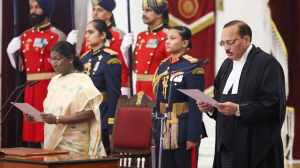Obama,Republicans far apart on how to cut US debt
US debt issue likely to pervade political atmosphere in 2012 presidential election.
Competing visions for solving America’s debt crisis get a side-by-side airing Wednesday as President Barack Obama details his plan to shrink the onerous deficit and the House of Representatives votes on a stingy 2012 Republican budget that would chip away the social safety net for older and poor Americans.
The debt issue likely will consume the American politics right through the 2012 presidential election,a partisan battle that will include fights over higher taxes for the wealthy against shrinking the role of government.
Both Wednesday events will serve as a prelude to a coming battle in Congress when it must vote in the coming few weeks to approve an increase in the federal debt limit,the amount the U.S. government can borrow. Increasing the limit on indebtedness normally is a routine matter,but this year some Republicans say they will try to load it down with demands for ever deeper spending cuts.
A failure to increase government borrowing power could lead the United States to default on its debt and,many experts say,tip the world economy back into economic crisis.
Republicans are driven toward sharp reductions in government outlays by the election last year of nearly 90 new members who are allied by the ultraconservative tea party movement.
Americans have adopted those concerns about spending as the annual deficit continues hitting record highs,estimated this year to be $1.5 trillion. The national debt already is more than $14 trillion. Most of that debt is held by China and other foreign governments,and the debt’s growth is seen as weakening the U.S. economy and leaving coming generations with a burden that would stifle growth and lower their standard of living.
Wednesday’s House vote will test Republican support for Rep. Paul Ryan’s 2012 budget plan that tackles two major sources of red ink,the government-run Medicare health insurance program for Americans 65 and older and Medicaid,the plan that provides health care for the poor.
Ryan and his backers want to start weaning Americans away from Medicare those now 55 or younger with a plan that would supplant the government program with a system of federal vouchers to buy private health insurance after they retire. The Medicaid program essentially would be farmed out to the 50 states in the form of block grants that the governors could use as they wished.
Democrats insist that plan would not get past the Senate,where they still hold a majority,and Obama probably would veto it in any case,unless there were major revisions.
The Ryan plan envisions,through spending cuts,slashing $5 trillion from deficits over the next decade. His budget not only fails to propose major new tax increases but also advocates lowering the top tax rates for both corporations and individuals to 25 percent from the current 35 percent.
That would happen in a climate that includes disclosures of low tax payments by some of the nation’s biggest companies,including General Electric Co.,which made $14.2 billion in worldwide profits last year,but paid no U.S. corporate taxes in 2010.
Before he outlines his views in a speech at George Washington University on Wednesday,Obama met with leading Democrats and Republicans in both houses of Congress to give them a preview.
Obama’s plan,which has not been spelled out in detail,was expected to bring back his recommendation,first made in the 2008 campaign,to end Bush-era tax cuts for households earning more than $250,000 a year. He temporarily set it aside when he signed onto a late 2010 agreement with Republicans to extend all Bush tax cuts for two years.
Even ending the Bush cuts for the wealthy would take tax rates on them only back to where they were in the 1990s,a decade of strong economic growth.
Obama also is expected to propose other changes in the tax code,which he contends benefits the rich.
“Every corner of the federal government has to be looked at here,” senior White House adviser David Plouffe said over the weekend. ”Revenues are going to have to be part of this.” “Revenues” has always been Washington code for higher taxes. Republicans were already girding for a confrontation.
“If the president begins the discussion by saying we must increase taxes on the American people as his budget does my response will be clear: Tax increases are unacceptable and are a nonstarter,” House Speaker John Boehner,a Republican,declared Tuesday. “We don’t have deficits because Americans are taxed too little,we have deficits because Washington spends too much.”
The bipartisan deficit-reduction commission appointed by Obama recommended late last year that about $4 trillion be slashed from budget deficits during the coming decade.
Roughly two-thirds of that would come through program cuts and one-third through increased taxes. Although overall tax rates would decline,dozens of popular tax breaks would be scaled back or eliminated,including the child tax credit,mortgage interest deduction and deduction claimed by employers who provide health insurance.
Obama praised the panel for its work,but embraced few of its recommendations,and none of the major ones on new taxes.
The president apparently had hoped to avoid the issue of tax increases until after the 2012 election,but his hand may have been forced by the severity and targets of the cuts in the Republican plan that will be voted on Wednesday.
Obama also is facing growing discontent among the liberal wing of his Democratic party,which believes he went too far in compromising with Republicans last week to get an agreement to fund the federal government through Sept. 30,the end of the fiscal year,and to prevent a shutdown of most federal agencies.



- 01
- 02
- 03
- 04
- 05



























